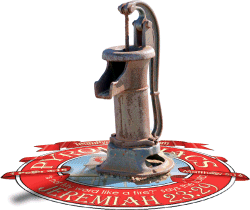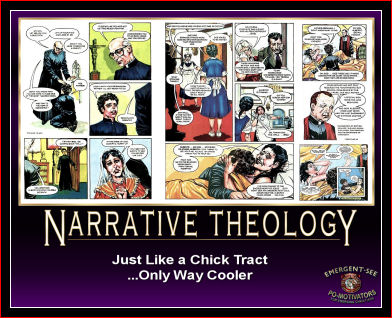by Dan Phillips[If I wasn't trying to swear off of starting open-ended series, I'd make this #1 of "Things I Will Die, Still Not Understanding."]
Think for a moment, if you will, Gentle Reader, of the
distinctives of Christianity.
Ponder the Christian explanation for
why man is such a mess, of
how everything began and why, of
what God has done to address the whole.
Or, think more specifically of
who God is, of His
oneness, of the
Trinity, of His
character, acts, decrees, will, and plan for the future.
Think of
Jesus, of His
divine nature and eternal goings-forth, of His
incarnation and life and teachings, of His
penal, substitutionary sacrifice, His
bodily death, resurrection, and assumption into Heaven, His
present activities from the right hand of God, and His
future return.
Think of the
Gospel plan in its eternal conception and historical fulfillment; think of
God's terms for reconciliation to Himself, and
His expressed will for how we think, make decisions, and live our lives.
Now, assuming you know any
truth about any of those things —
where did you get that?Were you born knowing it? Did it simply come to you, through breast or bottle? Did you receive it by prayer and meditation, reflecting on a sunset, gazing at tea leaves? Did an emotional state communicate it to you?
No. If you know
any truth about
any of those things, you know it from the
Bible. Period.
Now, maybe you've heard wonderful pastors preach, are blessed with marvelous godly friends, have read pithy and deep books, and are a lover of classical confessions. But insofar as any of those sources are worth anything to you, they are passing along truths gleaned straight from the
Bible.
And yet....How many Christians couldn't demonstrate some of their most cherished notions directly from the Bib

le to save their lives —
and don't care?The first part of that statement troubles me some, of course. But it's the
second part that absolutely thunderstruck slackjawed brain-itchingly
baffles me.
We say God is the most important person in our life, and....
Well, wait. Should I even assume that much? Am I justified in assuming, today, that someone knows that when he identifies himself as a "
Christian," he is, at the very least, saying that he believes, and believes in,
Christ? And that he has some muzzy notion that
Christ said (among many other things) that the command to love the Lord your God with all your heart, mind, soul and strength is the most important thing in the universe (Matthew 22:36-37)?
Okay, so reason it through with me here:
- Christ says that we are supposed to love the Lord our God with everything we've got.
- If we say we're Christians, we necessarily say we believe that to be true.
- The only way we are going to know anything about who this God is who we're supposed to love, or what it means to love Him, or how He wishes to be loved, is by personally studying the Bible.
- ...but we don't...
- ...and we don't care...
- ...and we revile, despise, and destroy the character and name of anyone who tries to provoke us to care.
See, I just don't get it. I honestly do not. Americans aren't required to be any particular religion at all. No one
has to say he's a Christian. It isn't hereditary, it isn't a genetic trait. So why say you're a Christian, voluntarily, and then just live like the claim is a big joke and you're a whopping great liar?
I wasn't a Christian. I
hated Christians, I despised them. Then, by an act of God's sovereign grace, I became one. I wasn't all that bright, but I did know that I didn't know much. And I knew I needed to know. And I knew that the only way I
could know was by (hel-lo?) studying the Bible.
Well, actually and honestly, no one needed to tell me. I wanted to. I believed because, well, I
believed. So I
wanted to know.
Now, I can understand some reasons why people who have been Christians for some time not knowing much. Maybe they're under pathetic teaching, or even positively discouraging teaching, and don't know any better. But not
wanting to know? You start trying to talk to them about the Bible, and they
shut you down? And then they're
angry when challenged to know more?
I see myself saying, "Wait, wait — you're telling me
you don't want to know God better? You
don't want to know more of His person, His will, His plans? That if you're believing and telling lies about Him, you'd
rather not know?"
Once, a fellow in a church I pastored got the idea of asking Christians to name the four Gospels. You know, just the four Gospels. Not the Minor Prophets or anything hard; just Matthew, Mark, Luke and John
He asked dozens of Christians. They were mostly mainstream Charismatics, but they included worship leaders, lay, all sorts, and all had been Christians for years.
His informal survey yielded two startling results:
- Either none, or only one, could name all four Gospels.
- They were, to a person, not upset with themselves for being so appallingly ignorant, but were upset with him for asking.
Then there is the related phenomenon of scores of Christians who actually seem to believe that a position
without a fragment of direct Biblical substantiation is
actually superior to one that

has a rich Scriptural basis.
I've run into this countless times. Here's a man who wanted to do something. I showed him from Scripture that it was a course of action that was expressly forbidden in Scripture. What was his answering case, from Scripture? None, not even a try. No, his answer was, "I don't want to hear any more of that Bible stuff." (As far as I recall, that's an exact quotation.)
Was he saying he wasn't a Christian anymore? Nope, not to his mind. He thought, and as far as I know still thinks, that he's a Christian. He'd simply joined the thronging masses of Christians-who-don't-care-what-the-Bible-says.
"But that's a contradiction in terms," you say.
Should be, I respond.
Pyro readers probably could contribute horror stories of their own.
So how do these people get by? Well, I think most would tell you they "just know." The feel the truth in their hearts, and they follow their hearts. Christian vapors.
Now it really doesn't take a PhD in Bible to say, emphatically and pointedly, that while this is a
religious position,
it is not a Christian position. From Testament (Genesis 18:19) to Testament (John 8:31-32) God makes it plain that His people must be taught, instructed, informed.
That is Christianity. Anything else is a fake.
What it actually is, is the Gospel of Hollywood. "Follow your heart." What scares and appalls me about that is not merely how many people believe it, but how many
professedly evangelical Christians believe it.
But an actual, card-carrying, practicing Christian should be able to tell you that
anyone who follows his heart, who believes that his deep and certain feelings communicated divine truth to him,
is a FOOL. Period. Why?
Because
God said so (Proverbs 28:26; Jeremiah 17:9).
And if we got our religion from the Bible instead of our culture, we'd
know that — and a whole lot more.

< /rant >

1:5-6; 5:10; 1 John 2:17; Revelation 21:4; 22



 On the other hand, the Relevant podcast. Wow. Where do you start? Maybe we could start with the urine jokes -- those were funny. Or maybe with the Seafood-flavored snack foods -- quite a chuckle that. Then there's the reference to a "fundamentalist blog" -- you know, the one which last week was posting
On the other hand, the Relevant podcast. Wow. Where do you start? Maybe we could start with the urine jokes -- those were funny. Or maybe with the Seafood-flavored snack foods -- quite a chuckle that. Then there's the reference to a "fundamentalist blog" -- you know, the one which last week was posting 

 For those not wanting to slog through the whole thing, the relevant part of
For those not wanting to slog through the whole thing, the relevant part of  But despite that one flash of insight, the level of hubris reflected in this podcast is breathtaking—especially their stunned blindness to the glaring reality that practically everything they said in the podcast bolstered the dead-on accuracy of
But despite that one flash of insight, the level of hubris reflected in this podcast is breathtaking—especially their stunned blindness to the glaring reality that practically everything they said in the podcast bolstered the dead-on accuracy of 
 y God's providence, just as Elijah arrived at Zarephath, this poor woman was going out to perform the sad task of collecting sticks for fuel to make what she was convinced would be her last meal. The same providence that led Elijah to Zarephath moved the widow to be out gathering sticks for her last meal. So she was the first person he saw. God's sovereignty is written all over this passage.
y God's providence, just as Elijah arrived at Zarephath, this poor woman was going out to perform the sad task of collecting sticks for fuel to make what she was convinced would be her last meal. The same providence that led Elijah to Zarephath moved the widow to be out gathering sticks for her last meal. So she was the first person he saw. God's sovereignty is written all over this passage. Notice also that even though this woman was in a hopeless situation, her despair had not yet caused her to lie down and give up. She remained occupied and busy, gathering fuel even for one last meal. A lot of people would have given up to depression and dejection and simply lay down to die. But this woman would continue to cook for her son until she had nothing left to cook. And it was her devotion to that duty that brought her across Elijah's path, and into the pathway of God's blessing.
Notice also that even though this woman was in a hopeless situation, her despair had not yet caused her to lie down and give up. She remained occupied and busy, gathering fuel even for one last meal. A lot of people would have given up to depression and dejection and simply lay down to die. But this woman would continue to cook for her son until she had nothing left to cook. And it was her devotion to that duty that brought her across Elijah's path, and into the pathway of God's blessing. Elijah didn't ask for all of her final measure of flour—only enough to make a very small cake—a token that would demonstrate a spark of faith in her. And God graciously moved her heart to obey. "She went and did according to the saying of Elijah: and she, and he, and her house, did eat many days. And the barrel of meal wasted not, neither did the cruse of oil fail, according to the word of the LORD, which he spake by Elijah" (vv. 15-16).
Elijah didn't ask for all of her final measure of flour—only enough to make a very small cake—a token that would demonstrate a spark of faith in her. And God graciously moved her heart to obey. "She went and did according to the saying of Elijah: and she, and he, and her house, did eat many days. And the barrel of meal wasted not, neither did the cruse of oil fail, according to the word of the LORD, which he spake by Elijah" (vv. 15-16).
 ere's an odd collection of five mostly-unrelated ideas that are floating around in my head today. We don't have enough blogspace in a normal week for me to post about all five of these topics in discrete blogposts. Four of them are fairly trivial anyway. (The first item is the only one that's truly important.) So I'll just cover them all as briefly as possible in one weekend post:
ere's an odd collection of five mostly-unrelated ideas that are floating around in my head today. We don't have enough blogspace in a normal week for me to post about all five of these topics in discrete blogposts. Four of them are fairly trivial anyway. (The first item is the only one that's truly important.) So I'll just cover them all as briefly as possible in one weekend post: I saw a teaser this morning for an upcoming feature on Fox News about the shocking decline in the number of Christians in the Middle East over the past decade. Ten years ago, some 12 million Christians lived in various Middle Eastern countries. They constituted a small and beleaguered minority even then, but today they number fewer than two million. Statistics show, for example, that in Bethlehem (whose population was 85 percent Christian just a few years ago) only 20 percent of the community are now Christians. Half of Iraq's Christian community has either left the country or been killed since the start of the war there. Martyrdoms, such as
I saw a teaser this morning for an upcoming feature on Fox News about the shocking decline in the number of Christians in the Middle East over the past decade. Ten years ago, some 12 million Christians lived in various Middle Eastern countries. They constituted a small and beleaguered minority even then, but today they number fewer than two million. Statistics show, for example, that in Bethlehem (whose population was 85 percent Christian just a few years ago) only 20 percent of the community are now Christians. Half of Iraq's Christian community has either left the country or been killed since the start of the war there. Martyrdoms, such as  As of this posting, even Fox's Web site has no articles featuring those data, so we'll watch Fox's Web space. But on the way to looking it up, I found
As of this posting, even Fox's Web site has no articles featuring those data, so we'll watch Fox's Web space. But on the way to looking it up, I found  Speaking of people with multiple claims to fame, I probably need to mention Frank Pastore. Several days ago, Pastore created
Speaking of people with multiple claims to fame, I probably need to mention Frank Pastore. Several days ago, Pastore created  efore I could quit my faith in the substitutionary work of the Lord Jesus Christ, and my confidence in the everlasting covenant ordered in all things and sure, I should have to be ground to powder, and every separate atom transformed.
efore I could quit my faith in the substitutionary work of the Lord Jesus Christ, and my confidence in the everlasting covenant ordered in all things and sure, I should have to be ground to powder, and every separate atom transformed. What would they give us in exchange for the faith? That is a question which it is easy to ask, but impossible to answer. Suppose the doctrines of grace could be obliterated, and our hope could be taken away, what would they give us in the place of them, either for this life or the next? I have never seen anything proposed in the place of the gospel that was worth considering for a second. Have you?
What would they give us in exchange for the faith? That is a question which it is easy to ask, but impossible to answer. Suppose the doctrines of grace could be obliterated, and our hope could be taken away, what would they give us in the place of them, either for this life or the next? I have never seen anything proposed in the place of the gospel that was worth considering for a second. Have you? Note what we owe them, and let us pay to our sons the debt we owe our fathers. It is to-day as it was in the Reformers' days. Decision is needed. Here is the day for the man, where is the man for the day? We who have had the gospel passed to us by martyr hands dare not trifle with it, nor sit by and hear it denied by traitors, who pretend to love it, but inwardly abhor every line of it. The faith I hold bears upon it marks of the blood of my ancestors. Shall I deny their faith, for which they left their native land to sojourn here? Shall we cast away the treasure which was handed to us through the bars of prisons, or came to us charred with the flames of Smithfield?
Note what we owe them, and let us pay to our sons the debt we owe our fathers. It is to-day as it was in the Reformers' days. Decision is needed. Here is the day for the man, where is the man for the day? We who have had the gospel passed to us by martyr hands dare not trifle with it, nor sit by and hear it denied by traitors, who pretend to love it, but inwardly abhor every line of it. The faith I hold bears upon it marks of the blood of my ancestors. Shall I deny their faith, for which they left their native land to sojourn here? Shall we cast away the treasure which was handed to us through the bars of prisons, or came to us charred with the flames of Smithfield?
 hy did God send Elijah to the home of a Gentile widow?
hy did God send Elijah to the home of a Gentile widow? When Elijah met her, she was preparing a meal with the expectation that this would be the last morsel of food she would ever taste before she and her little boy starved to death.
When Elijah met her, she was preparing a meal with the expectation that this would be the last morsel of food she would ever taste before she and her little boy starved to death. that she had recently lost a child, very sadly. She wanted to share that the post had been encouraging to her.
that she had recently lost a child, very sadly. She wanted to share that the post had been encouraging to her. Here's what I mean. When a death, or other tragedy, strikes, one's emotions are all a-jangle. There are many quick decisions and adjustments. That's when an even-half-alive church is
Here's what I mean. When a death, or other tragedy, strikes, one's emotions are all a-jangle. There are many quick decisions and adjustments. That's when an even-half-alive church is  who did him the most good was a man who simply walked up, put his arm around his shoulders, and stood with him for a bit. Whether it's "I'm thinking of you and praying for you," or asking, "How are you doing?", we needn't rewrite Calvin's
who did him the most good was a man who simply walked up, put his arm around his shoulders, and stood with him for a bit. Whether it's "I'm thinking of you and praying for you," or asking, "How are you doing?", we needn't rewrite Calvin's  ere's the last entry in this series. It doesn't exhaust the full collection of posters (there are 20 so far), but you can see them all if you follow the link at the bottom of this post.
ere's the last entry in this series. It doesn't exhaust the full collection of posters (there are 20 so far), but you can see them all if you follow the link at the bottom of this post.








 Think for a moment, if you will, Gentle Reader, of the
Think for a moment, if you will, Gentle Reader, of the  le to save their lives —
le to save their lives —  has a rich Scriptural basis.
has a rich Scriptural basis.












